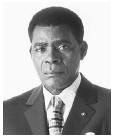EQUATORIAL GUINEA
Teodoro Obiang Nguema Mbasogo
President

(pronounced "tay-oh-DO-ro OH-bee-ong eng-GWAY-muh em-bah-SOH-go")
"This idea that there has been a climate of intimidation doesn't correspond to concrete reality."
The Republic of Equatorial Guinea (La República de Guinea Ecuatorial) is in west central Africa at latitude 2º north and longitude 10º east. The country's territory comprises the coastal enclave of Rio Muni, situated between the southwest corner of Cameroon and the northwest corner of Gabon; the island of Bioko, off the coast of Cameroon; and Annobon and Corisco in Corisco Bay. The total land area is 28,050 sq km (10,831 sq mi). The capital of Equatorial Guinea is Malabo on the island of Bioko. Bata is the principal city of Rio Muni. The country contains seven provinces: Pagalu, Bioko Norte, Bioko Sur, Centro Sur, Kie-Ntem, Litoral, and Wele-Nzas. Bioko and the smaller islands are of volcanic origin. In Rio Muni, a coastal plain rises to thickly forested hills in the interior. The climate is very hot and humid year-round.
Eighty percent of the country's population belongs to the Fang tribe. The Bubi account for about 15% of the population. A half dozen other ethnic groups, each speaking its own language, make up the remaining 5% of the population. A small European community, mostly Spanish, also lives there. Because of Equatorial Guinea's recent colonial history, the country's official language is Spanish. Fang and Pichinglis (Pidgin English) are the lingua franca. Minority languages include Benga, Bubi, Crioulo, Krio, Ngumba, Ngumbi, and Yasa. Three-fourths of the population practices Roman Catholicism, sometimes mingling it with pre-Christian traditions. About 20% of the population is animist. The population of Equatorial Guinea was estimated at 498,144 in 2002.
The vast majority of Equatoguineans still practice subsistence agriculture, raising bananas, manioc, yams, cassava, oil palm nuts, and livestock. Agriculture, forestry, and fisheries account for roughly one-half of gross domestic product (GDP) with coffee, timber, and cocoa being the primary export commodities. Export crop production has dropped dramatically since independence, however. Once known as the "Switzerland of Africa" cocoa production on Bioko has declined since the late 1960s. The country's precarious financial situation is expected to improve soon, as major new offshore oil deposits are phased into production. The country may also have untapped mineral resources, including alluvial gold, iron ore, manganese, titanium, and uranium. The unit of currency is the Communauté Financière Africaine (CFA) franc. Per capita GDP was estimated at US $2,100 in 2002.
ADDRESS
Oficina del Presidente, Malabo, República de Guinea Ecuatorial
Comment about this article, ask questions, or add new information about this topic: